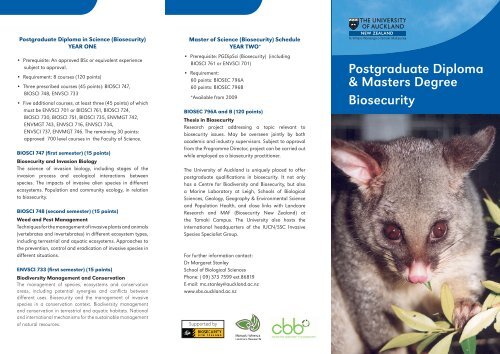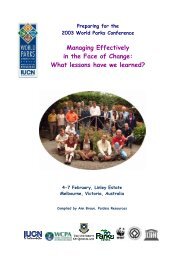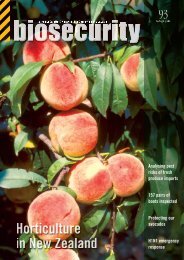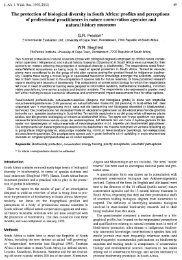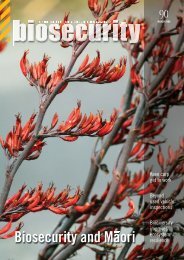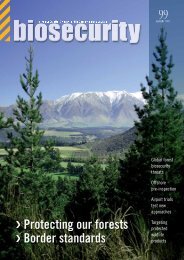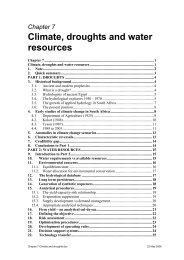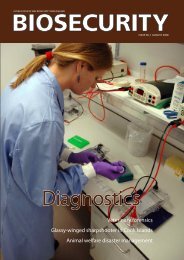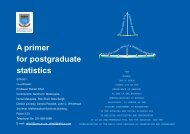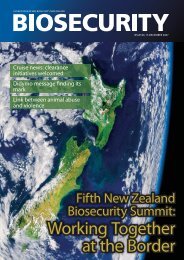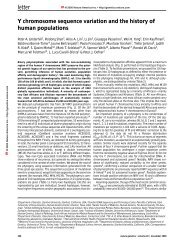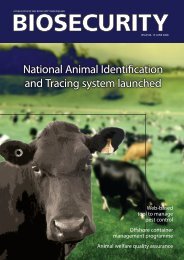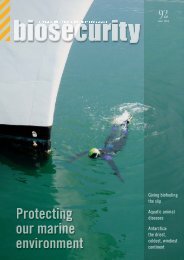Postgraduate Diploma & Masters Degree Biosecurity
Postgraduate Diploma & Masters Degree Biosecurity
Postgraduate Diploma & Masters Degree Biosecurity
Create successful ePaper yourself
Turn your PDF publications into a flip-book with our unique Google optimized e-Paper software.
<strong>Postgraduate</strong> <strong>Diploma</strong> in Science (<strong>Biosecurity</strong>)<br />
YEAR ONE<br />
• Prerequisite: An approved BSc or equivalent experience<br />
subject to approval.<br />
• Requirement: 8 courses (120 points)<br />
• Three prescribed courses (45 points): BIOSCI 747,<br />
BIOSCI 748, ENVSCI 733<br />
• Five additional courses, at least three (45 points) of which<br />
must be ENVSCI 701 or BIOSCI 761, BIOSCI 724,<br />
BIOSCI 730, BIOSCI 751, BIOSCI 735, ENVMGT 742,<br />
ENVMGT 743, ENVSCI 716, ENVSCI 734,<br />
ENVSCI 737, ENVMGT 746. The remaining 30 points:<br />
approved 700 level courses in the Faculty of Science.<br />
BIOSCI 747 (first semester) (15 points)<br />
<strong>Biosecurity</strong> and Invasion Biology<br />
The science of invasion biology, including stages of the<br />
invasion process and ecological interactions between<br />
species. The impacts of invasive alien species in different<br />
ecosystems. Population and community ecology, in relation<br />
to biosecurity.<br />
BIOSCI 748 (second semester) (15 points)<br />
Weed and Pest Management<br />
Techniques for the management of invasive plants and animals<br />
(vertebrates and invertebrates) in different ecosystem types,<br />
including terrestrial and aquatic ecosystems. Approaches to<br />
the prevention, control and eradication of invasive species in<br />
different situations.<br />
ENVSCI 733 (first semester) (15 points)<br />
Biodiversity Management and Conservation<br />
The management of species, ecosystems and conservation<br />
areas, including potential synergies and conflicts between<br />
different uses. <strong>Biosecurity</strong> and the management of invasive<br />
species in a conservation context. Biodiversity management<br />
and conservation in terrestrial and aquatic habitats. National<br />
and international mechanisms for the sustainable management<br />
of natural resources.<br />
Master of Science (<strong>Biosecurity</strong>) Schedule<br />
YEAR TWO*<br />
• Prerequisite: PGDipSci (<strong>Biosecurity</strong>) (including<br />
BIOSCI 761 or ENVSCI 701)<br />
• Requirement:<br />
60 points: BIOSEC 796A<br />
60 points: BIOSEC 796B<br />
*Available from 2009<br />
BIOSEC 796A and B (120 points)<br />
Thesis in <strong>Biosecurity</strong><br />
Research project addressing a topic relevant to<br />
biosecurity issues. May be overseen jointly by both<br />
academic and industry supervisors. Subject to approval<br />
from the Programme Director, project can be carried out<br />
while employed as a biosecurity practitioner.<br />
The University of Auckland is uniquely placed to offer<br />
postgraduate qualifications in biosecurity. It not only<br />
has a Centre for Biodiversity and <strong>Biosecurity</strong>, but also<br />
a Marine Laboratory at Leigh, Schools of Biological<br />
Sciences, Geology, Geography & Environmental Science<br />
and Population Health, and close links with Landcare<br />
Research and MAF (<strong>Biosecurity</strong> New Zealand) at<br />
the Tamaki Campus. The University also hosts the<br />
international headquarters of the IUCN/SSC Invasive<br />
Species Specialist Group.<br />
For further information contact:<br />
Dr Margaret Stanley<br />
School of Biological Sciences<br />
Phone: ( 09) 373 7599 ext.86819<br />
E-mail: mc.stanley@auckland.ac.nz<br />
www.sbs.auckland.ac.nz<br />
Supported by<br />
<strong>Postgraduate</strong> <strong>Diploma</strong><br />
& <strong>Masters</strong> <strong>Degree</strong><br />
<strong>Biosecurity</strong>
<strong>Biosecurity</strong><br />
Advanced training for graduates and biosecurity practitioners<br />
who wish to learn more about invasion biology and the science<br />
behind current biosecurity issues.<br />
Courses<br />
• <strong>Biosecurity</strong> and invasion biology<br />
• Weed and pest management<br />
• Assessing environmental change and effects<br />
• Entomology and biosecurity<br />
• Advanced plant pathology<br />
• Marine ecology<br />
• Environmental policy and governance<br />
• Research planning and communication<br />
• Aquatic ecological assessment<br />
• Biodiversity management and conservation<br />
• Collaborative conservation and indigenous rights<br />
Jointly presented by the School of Biological Sciences and the<br />
School of Geography, Geology and Environmental Science in<br />
partnership with Landcare Research through the Centre of<br />
Biodiversity and <strong>Biosecurity</strong> (CBB). The course will be run from<br />
the Tamaki Campus of the University of Auckland, in conjunction<br />
with the new Centre for Biodiversity and <strong>Biosecurity</strong>.<br />
The invasive sea squirt, Styela clava or<br />
clubbed tunicate.<br />
Invasive heather (Calluna vulgaris) in Tongariro National Park.<br />
Goals of the programme<br />
The <strong>Postgraduate</strong> <strong>Diploma</strong> in Science and Master of Science in<br />
<strong>Biosecurity</strong> represent new interdisciplinary programmes which<br />
aim to give science graduates and biosecurity practitioners<br />
the skills to move with confidence in the rapidly growing field<br />
of biosecurity. Graduates will be equipped to understand and<br />
protect the natural environment (both terrestrial and aquatic)<br />
from biosecurity threats. The programmes cover a range of<br />
topics including new discoveries in contemporary environmental<br />
and life sciences and their translation into tools for prevention<br />
and management of invasive species. The programmes will also<br />
offer networking opportunities for students to meet practitioners<br />
and leaders from the biosecurity sector and related research<br />
areas.<br />
Simon Fowler, Landcare Research<br />
Employment<br />
Opportunities<br />
Potential opportunities for<br />
graduates include employment<br />
throughout the biosecurity<br />
sector in organisations such<br />
as MAF (<strong>Biosecurity</strong> New<br />
Zealand), local government,<br />
research consultancies, private<br />
pest control companies, nongovernmental<br />
conservation<br />
organisations, Department of<br />
Conservation, Crown Research<br />
Institutes, tertiary education<br />
sector.<br />
Enrolment Flexibility<br />
Candidates for entry in the PGDipSci (<strong>Biosecurity</strong>) must have<br />
a BSc or equivalent experience subject to approval. To gain<br />
the <strong>Postgraduate</strong> <strong>Diploma</strong> in <strong>Biosecurity</strong> you need to take all<br />
three prescribed courses plus five other approved courses.<br />
The <strong>Diploma</strong> is designed to meet the needs of biosecurity<br />
practitioners and graduates seeking employment in this field.<br />
It consists mainly of intensive modular courses (c. 1-2 weeks<br />
formal contact) that can all be taken in one year (as a full time<br />
student), or over a longer period (as a part time student).<br />
The Master of Science (<strong>Biosecurity</strong>) requires the successful<br />
completion of the <strong>Postgraduate</strong> <strong>Diploma</strong> and will be launched<br />
in 2009. It includes a research project that can be carried out in<br />
a University, company or government environment.<br />
The Cawthron Institute<br />
Didymo (Didymosphenia geminata) in the Hawea River<br />
Darren Ward, Landcare Research<br />
The German wasp (Vespula germanica).<br />
Richard Toft, Landcare Research<br />
Pampas grass (Cortaderia selloana).<br />
Landcare Research


